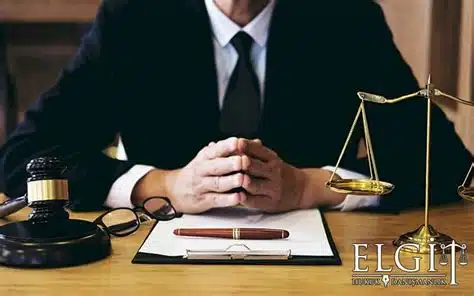How To File For Bankruptcy In Ny Without A Lawyer
Filing for bankruptcy is a challenging and overwhelming process, especially when you don’t have the resources to hire a lawyer. However, it is possible to file for bankruptcy in New York State without a lawyer. This article will guide you through the essential steps to take when filing for bankruptcy without legal representation.
First, you need to determine which type of bankruptcy to file. There are two types of bankruptcy available to individuals in New York: Chapter 7 and Chapter 13. Chapter 7 bankruptcy involves liquidation of assets to pay off creditors while Chapter 13 involves creating a repayment plan over a specific period.
Once you have determined the type of bankruptcy to file, you need to gather all necessary documents such as your income statements, tax returns, and a list of your debts. It would help if you also completed credit counseling with an approved agency before filing for bankruptcy.
After gathering the necessary information, you need to fill out the appropriate forms and file them with the bankruptcy court in your area. The forms can be accessed online or in person at the courthouse. You also need to pay the filing fee, which varies depending on the chapter of bankruptcy you are filing.
It is crucial to note that even though you don’t have a lawyer, you may still be required to attend a meeting with your creditors. During this meeting, the trustee will ask you questions about your finances, assets, and debts. You must answer these questions truthfully and accurately.
In conclusion, filing for bankruptcy without a lawyer in New York State is possible, but it requires thorough preparation and attention to detail. By carefully following the outlined steps, you can successfully navigate the process and achieve financial relief. However, if you feel overwhelmed or confused at any point, it is recommended that you seek legal advice to ensure you make the best decisions for your financial future.
Process for Filing for Bankruptcy in New York without a Lawyer
Filing for bankruptcy in New York can be a daunting and overwhelming process, but it doesn’t have to be. While you may think that hiring a lawyer is necessary, it’s possible to file for bankruptcy without one. Here’s a step-by-step guide on how to do so:
1. Determine which type of bankruptcy to file: There are two types of bankruptcy that individuals can file for in New York – Chapter 7 and Chapter 13. Chapter 7 bankruptcy involves liquidating assets to pay off debt, while Chapter 13 bankruptcy involves developing a repayment plan over three to five years. Consider your financial situation carefully and consult with a credit counselor before making this decision.
2. Complete the required credit counseling course: Before filing for bankruptcy, you must complete an approved credit counseling course. This can typically be done online and takes about 90 minutes to complete.
3. Fill out the necessary forms: The next step is to fill out the necessary bankruptcy forms, which can be found on the United States Courts website. These forms include the petition, schedules, and statement of financial affairs. Be sure to complete these forms accurately and honestly.
4. File the forms with the bankruptcy court: After completing the forms, you’ll need to file them with the bankruptcy court in your district. There will be a filing fee, which can be waived in certain circumstances.
5. Attend the 341 meeting: About a month after filing, you’ll attend a meeting of creditors, also known as a 341 meeting. This meeting allows creditors to ask questions about your finances and bankruptcy case. It’s important to be prepared and honest during this meeting.
6. Complete the financial management course: After the 341 meeting, you’ll need to complete a financial management course. This can also be done online and takes about two hours to complete.
7. Receive your discharge: If everything goes smoothly, you’ll receive a discharge of your debts about three to four months after filing. This means that your debts will be eliminated or you’ll have a repayment plan in place.
Filing for bankruptcy without a lawyer can be challenging, but it’s possible. By following these steps and being honest and thorough throughout the process, you can successfully navigate the bankruptcy system and get the fresh start you need.
Required Paperwork for Filing Bankruptcy in New York without a Lawyer

Filing for bankruptcy can be a daunting task, especially if you are unfamiliar with the legal system. However, if you’re considering filing for bankruptcy in New York, it is important to know what paperwork you need to file before beginning the process.
The first step in filing for bankruptcy without a lawyer is to determine which type of bankruptcy is right for you. In New York, there are two common types of bankruptcy: Chapter 7 and Chapter 13. Chapter 7 bankruptcy will discharge most unsecured debt, while Chapter 13 bankruptcy will allow you to restructure your debt into a manageable payment plan.
Once you have determined which type of bankruptcy is right for you, you will need to gather several documents. These include:
1. Credit counseling certificate: Before filing for bankruptcy, you must complete a credit counseling session with an approved agency and obtain a certificate of completion.
2. Bankruptcy petition: This document officially starts the bankruptcy process and lists all of your creditors and assets.
3. Schedules: These documents provide detailed information about your income, expenses, debts, and assets.
4. Means test: If you are filing for Chapter 7 bankruptcy, you will need to complete a means test to determine if you qualify for this type of bankruptcy.

5. Statement of financial affairs: This document provides information about your recent financial history, including any transfers or sales of property.
6. Tax returns: You will need to provide copies of your federal and state tax returns for the previous two years.
7. Bank statements: You will need to provide copies of your bank statements for the previous six months.
Once you have gathered all of the necessary paperwork, you will need to file it with the bankruptcy court in your district. It is important to ensure that all of the information you provide is complete and accurate, as any errors or omissions could result in your case being dismissed.
In conclusion, filing for bankruptcy in New York without a lawyer requires knowledge about the required paperwork. Gather all necessary documents, complete the forms accurately, and file with the bankruptcy court in your district. It is important to understand the process fully to avoid any unnecessary complications.
Debt Counseling and Debtor Education Requirements in New York
Debt is a common issue that many people face. It can become overwhelming, leading to financial instability, stress, and anxiety. If you live in New York and are struggling with debt, it’s essential to understand the state’s debt counseling and debtor education requirements.
New York State requires individuals filing for bankruptcy to complete pre-filing credit counseling from an approved agency. This requirement aims to help consumers understand their financial situation better and explore alternatives to bankruptcy. The counseling must take place within 180 days before filing for bankruptcy.
Once the court approves the bankruptcy filing, individuals must also complete a debtor education course from an approved provider. The purpose of this course is to provide information on personal financial management, including managing money, using credit wisely, and creating and sticking to a budget. You must complete the debtor education course before the discharge of your debts.
New York offers protections for consumers against predatory practices by debt settlement companies and debt relief services. Debt settlement companies cannot charge upfront fees and must settle at least one debt before seeking payment. Debt relief services must be licensed by the New York Department of Financial Services and follow specific regulations.
In addition to counseling and education requirements, New York provides various resources to help individuals manage their debt effectively. The New York State Consumer Protection Board offers advice on managing debt, avoiding scams, and understanding credit reports. The board also provides a list of approved credit counseling agencies and debt relief services.
In conclusion, if you live in New York and are facing debt, it’s important to understand the state’s debt counseling and debtor education requirements. These requirements can help you make informed decisions about your financial future and avoid falling prey to scams or predatory practices. By taking advantage of available resources and seeking professional guidance, you can take steps towards financial stability and peace of mind.
Meeting with Creditors after Filing for Bankruptcy in New York
Bankruptcy can be a challenging and overwhelming experience, but it is often the best solution for those facing insurmountable debt. However, filing for bankruptcy does not mean that your financial troubles are immediately resolved. After filing for bankruptcy in New York, you will need to attend a meeting with your creditors, which can be stressful and intimidating. In this article, we will provide an overview of what to expect during a meeting with creditors after filing for bankruptcy in New York.
The meeting with creditors, also known as a 341 hearing or a meeting of creditors, typically takes place within four to six weeks after you file for bankruptcy. During this meeting, you will meet with the trustee appointed to your case and any creditors who choose to attend. The trustee will ask you several questions under oath about your financial affairs and the information included in your bankruptcy petition.
Although the idea of facing your creditors may sound daunting, keep in mind that these meetings are usually straightforward and brief. Creditors rarely attend, and those who do only have a limited amount of time to ask questions. Moreover, your bankruptcy attorney will be present at the meeting to provide guidance and support throughout the process.
To prepare for the meeting, you should review your bankruptcy petition and make sure all the information is accurate and complete. You should also gather any documents requested by the trustee, such as bank statements, tax returns, or other financial records. Your bankruptcy attorney will provide you with a list of necessary documents and advise you on how to answer the trustee’s questions truthfully and accurately.
In conclusion, meeting with your creditors after filing for bankruptcy in New York can be nerve-wracking, but it is a necessary step in the bankruptcy process. By working closely with your attorney and preparing thoroughly, you can ensure that the meeting proceeds smoothly and help put you on the path to a more stable financial future.
The Role of the Bankruptcy Trustee in New York
If you’re considering filing for bankruptcy in New York, it’s crucial to understand the role of a bankruptcy trustee. Bankruptcy trustees are appointed by the United States Trustee Program, an agency within the Department of Justice, to oversee your case and ensure that your creditors are treated fairly. Here’s what you need to know about their role in the bankruptcy process.
When you file for bankruptcy, the trustee’s job is to examine your finances, review your bankruptcy petition, and investigate your assets and liabilities. They also have the authority to sell nonexempt property that you own and use the proceeds to repay your creditors.
Bankruptcy trustees play an important role in Chapter 7 bankruptcy cases, where most of your debts are discharged, or wiped out. In these cases, the trustee will liquidate any nonexempt assets you own and distribute the proceeds to your creditors. The trustee will also review your bankruptcy petition and look for any fraudulent or improper activity on your part.
In Chapter 13 bankruptcy cases, which involve a repayment plan, the trustee’s role is slightly different. Instead of liquidating assets, the trustee reviews your proposed repayment plan and ensures that it’s feasible and meets the requirements of the Bankruptcy Code. They’ll also collect your monthly payments and distribute them to your creditors.
Throughout the bankruptcy process, the trustee acts as an impartial third party, working to ensure that both you and your creditors are treated fairly. They’ll also work with your bankruptcy attorney to resolve any disputes that may arise.

In conclusion, if you’re considering filing for bankruptcy in New York, it’s important to understand the role of the bankruptcy trustee in your case. While they have broad powers to examine your finances and investigate your assets, their ultimate goal is to help ensure that your debts are resolved equitably and that you can move forward with a fresh financial start.
Common Mistakes to Avoid When Filing for Bankruptcy in New York without a Lawyer
Filing for bankruptcy can be a difficult and overwhelming process, especially when you’re doing it alone without the help of a lawyer. If you live in New York and are considering filing for bankruptcy, there are several common mistakes that you should avoid to ensure a successful outcome.
The first mistake that many people make is failing to gather all of the necessary documentation before starting the bankruptcy process. You will need to provide detailed information about your income, expenses, debts, assets, and other financial information to the court. Without this information, your case may be delayed or even dismissed. It’s important to take the time to gather all of the necessary documents before beginning the process.
Another common mistake is failing to attend the mandatory credit counseling sessions required by the court. These sessions are designed to help you understand your options and make informed decisions about your finances. Failure to attend these sessions can result in your case being dismissed.
Many people also make the mistake of transferring assets or paying off debts to friends or family members before filing for bankruptcy. This can be seen as an attempt to hide assets or defraud creditors, which can result in serious legal consequences. It’s important to be honest and transparent throughout the entire bankruptcy process.
In addition, many people make the mistake of choosing the wrong type of bankruptcy for their situation. There are several different types of bankruptcy, each with its own requirements and limitations. Choosing the right one can have a significant impact on the outcome of your case.
Finally, many people make the mistake of failing to seek the advice of a qualified bankruptcy attorney. While it is possible to file for bankruptcy without a lawyer, it can be a complex and confusing process. A qualified attorney can help guide you through the process and ensure that your rights are protected.
In conclusion, filing for bankruptcy in New York without a lawyer can be challenging, but avoiding these common mistakes can help ensure a successful outcome. By gathering all necessary documentation, attending credit counseling sessions, being transparent about your assets and debts, choosing the right type of bankruptcy, and seeking the advice of a qualified attorney, you can navigate the process with confidence and ease.





